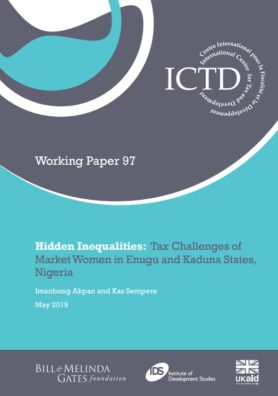Working Paper 97
This paper presents the findings of a study on gender-based taxation differences among market traders in two Nigerian states. At a high level, no significant differences were found between female and male traders in the markets visited in terms of tax payments, payments for market services and tax increases. However, a closer look at the data shows implicit tax biases that affect women negatively. Although female traders pay the same amount of presumptive tax as male traders, they earn much less. Even female traders selling the same types of products as their male counterparts tend to earn less. Additionally, common tax increases beyond the legally stipulated amount, as well as the burden of unpaid care work (that keeps women away from earning more money), also aggravate the observed anti-woman tax bias. Based on these findings we recommend, in line with suggestions made by interviewed market leaders, that Nigerian tax policymakers should develop a segmented system of presumptive taxation more closely based on actual earnings, or at least based on the type of product sold. Such segmentation would help to alleviate the gender bias inherent to the current presumptive taxation system. This study also finds that all market traders value the benefits of female tax collectors. In general, this preference is due to a perception among traders that female tax collectors are more understanding and calmer than male tax collectors. Female tax collectors were also not reported to be involved in asking for sexual favours, which was a complaint levelled against some of their male colleagues. Some markets have even taken the initiative to create mixed-gender tax collection groups, and to replace male tax collectors reported for harassing women sexually with female tax collectors. Based on these findings we recommend that, in line with previous literature, Nigerian tax authorities should work to integrate more female tax collectors into the public tax system, as well as in the market unions and associations that act as tax collection agents for the government.
Read the 2-page brief version here.
